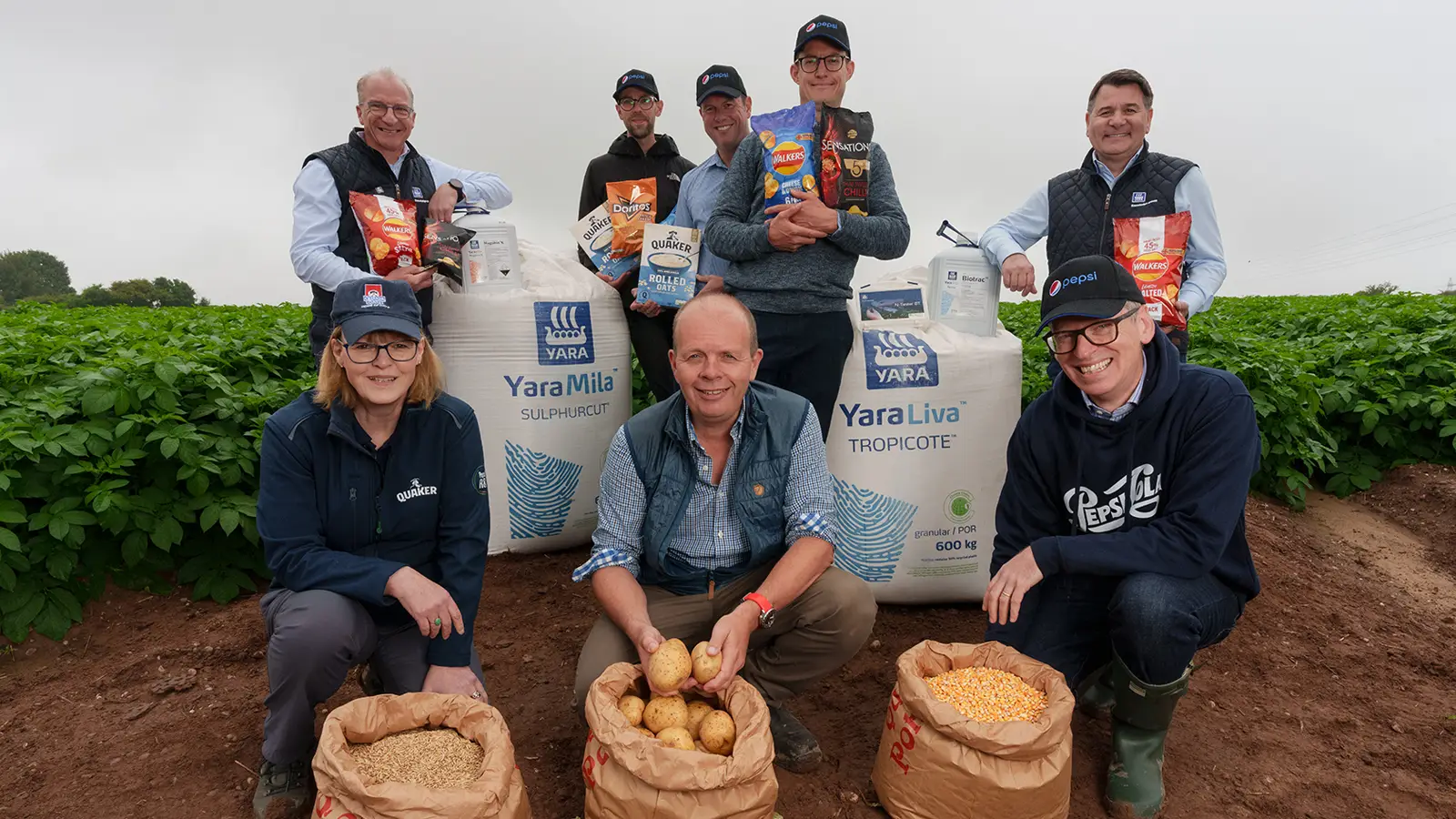This case study has been developed in response to WBCSD Scope 3 action agenda publication which identified in value chain collaboration in co-financing as one of the key barriers to scope 3 action. This case study is intended to demonstrate that collaboration to reduce shared emissions between upstream and downstream stakeholders in a value is not only possible, but also cost-effective, impactful and scalable.
Here, we focus on a critical decarbonization lever, fertilizer management and the partnership between a nitrates manufacturer, food company and farmers. Upcoming cases will provide co-financing examples in other critical decarbonization levers. The series of case studies will form part of a broader toolbox to support in scope 3 action for the agriculture and food industry.
The combination of PepsiCo Europe’s strong agronomy team and access to on-farm data with Yara’s knowledge on nutrient management and digital tools makes the partnership very complementary.
– Archana Jagannathan
To transform our food system, we need to collaborate across the entire food value chain. Working with first movers like PepsiCo Europe will help make this a reality.
– Mónica Andrés Enríquez, Executive Vice President for Europe at Yara International
Yara and PepsiCo Europe joining forces on crop nutrition
Around half of the food we eat is produced using fertilizers, which provide crops with the essential nutrients they need to improve yield and quality, helping ensure food security and human health. However, fertilizers also contribute significantly to global warming, representing roughly 5% of global greenhouse gas (GHG) emissions where one third of the emissions come from the production of fertilizers and two thirds from their on-farm use. Reducing these GHG emissions is therefore crucial.
Yara, a leading crop nutrition company, and PepsiCo Europe, a leading food and beverage company, have entered into a long-term partnership to reduce on-farm GHG emissions through best practice in fertilizer management. The emissions relative to fertilizer and its use on the farm are shared emissions between Yara and PepsiCo. For Yara, the fertilizer product carbon footprint (PCF) is classified as scope 1, and emissions from the use in the field as scope 3 (category 11).
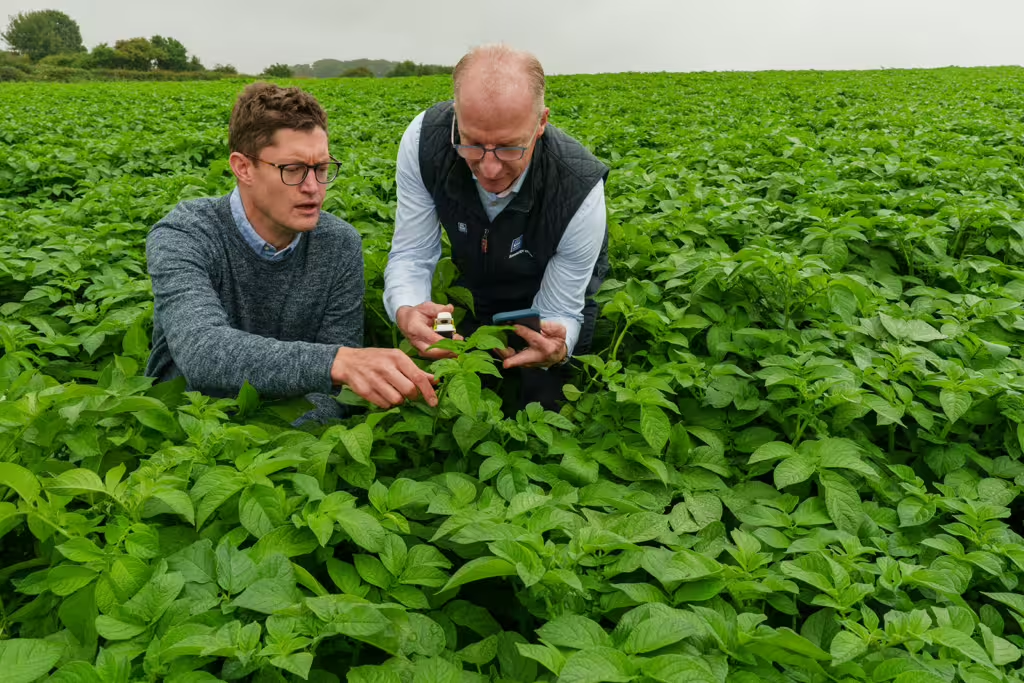
Indirect GHG emissions related to the use of its products represented around52% of Yara’s total emissions in 2023. For PepsiCo Europe, fertilizer production and its use in the field contributes to 50% of the agricultural crop PCF (scope 3, category 1), and 50% of purchased crop PCF (scope 3, category 1). This represents a huge opportunity for the two companies to collaborate to reduce common shared emission hotspots.
A long-term collaboration addressing key decarbonization levers
PepsiCo Europe is supplying Yara fertilizers and services to farmers, including digital tools to optimize nitrogen use efficiency:
- Reducing the carbon footprint of fertilizers: Yara is providing PepsiCo farmers with low-carbon footprint fertilizers, produced from renewable ammonia or low-carbon ammonia via carbon capture and storage (CCS). Yara has invested in solutions to reduce GHG emissions from the production of fertilizer and will continue to invest in innovation in manufacturing processes to further reduce fertilizer PCF.
- Improving fertilizer application on the farm: Yara is providing in-field services to farmers to advise them on the best crop nutrition practices and digital tools to improve nitrogen use efficiency (NUE), boost yields, improve soil health and reduce the carbon footprint of crops. Yara invests in R&D to develop tools to scale up solutions to reduce emissions on the farm.
- Planning seasonal crop nutrition management: At the start of the crop season, Yara agronomists define a customized crop nutrition plan based on soil analysis, context and geography. During the season, the data is collected to finetune fertilization plans according to the needs of the crop and to plan for the following crop cycle.
Yara will deliver up to 165,000 tons of fertilizer/year to PepsiCo Europe, meeting the needs of 25% of farmers within its European supply chain by 2030.
The key objective of the partnership is to reduce the GHG emissions on farm relative to fertilizer, reducing the PCF of crops, while improving yield (which can increase up to 15% depending on the current practices and geographies). Farmers are at the center of this initiative.
Partnership results and scale-up
The partnership kicked off in 2024 with a selective group of potato farmers in continental Europe. The rollout will be progressive and cover ~128,000 hectares and include ~1,000 farms across the EU (Belgium, France, Poland, the Netherlands) and the UK. For PepsiCo Europe, the initial priority is potato, but the project will be scaled to include additional crops such as oats, oilseed and corn.
The partnership is expected to result in a reduction of up to 80% in GHG emissions related to fertilizer production and a reduction of up to 20% of in-field fertilizer use emissions by 2030, while maintaining crop quality and yields.
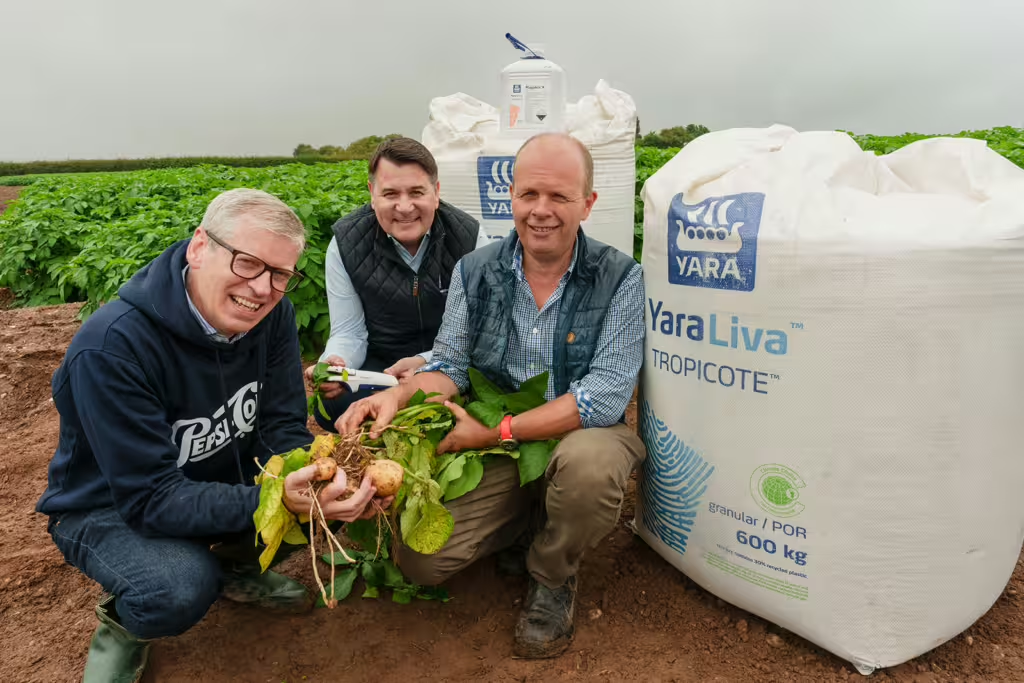
This type of partnership is easily replicable and Yara is already collaborating with other agri-food companies towards reaching common decarbonization goals, with companies such as Lantmännen, Bindewald & Gutting Milling Group and Simpsons Malt.
Monitoring, reporting and verification
The partnership leverages industry-recognized measurement tools and third-party verification. The project expects to improve the measurement approach over time and is considering how to develop technology to streamline data collection as part of a continuous digital improvement journey.
- Production of fertilizers: Yara collects and monitors the GHG emissions from the production of fertilizers and calculates fertilizer PCF, which is verified by an independent third-party DNV.
- On-farm emissions: Prior to the start of the partnership, PepsiCo Europe and Yara Europe worked together to collect information on farm data and current practices to set the baseline. Yara and PepsiCo Europe collect on-farm data relative to farm practices and Yara calculates the PCF of the crop (e.g., CO2/ton) and passes this data to PepsiCo along with information relative to yield and quality.
Collaborating to reduce shared on-farm emissions will impact the GHG inventory of both companies
- Yara: The investment made to transition to more sustainable production practices results in scope 1 and 2 GHG emission reductions. The improvement of on-farm crop nutrition practices reduces Yara’s scope 3 emissions. These GHG emission reductions are reported within Yara’s GHG inventory and towards its climate targets.
- PepsiCo Europe: Purchasing crops with a lower PCF from suppliers reduces scope 3 (cat. 1). Food companies can claim in their inventory the benefit from reduced fertilizer PCF, and reduced use of fertilizer in the field.
Success factors and learnings
- Sharing costs and benefits: By collaborating, both companies are able to share costs and mitigate risks in the transition to a more sustainable food system, while also benefitting from the reduction of emissions from a scope 3 hotspot.
- Shared climate objectives: The collaboration underlines the two like-minded companies’ shared commitment to building a more sustainable food system in line with their climate targets.
- Structured agreement, clear KPIs: The collaboration has well-defined KPIs and governance as well as a long-term roadmap taking into account each company’s priorities regarding crops, geographies and objectives.
- Multidisciplinary teams: Multidisciplinary teams with different expertise are needed to execute on the actions in the roadmap.
- Farmers at the center: Solutions are tailor made to meet farmers’ needs.
- Significant impact: Long-term, large-scale partnership designed to deliver significant impact.
Reducing GHG emissions of fertilizer is a significant mitigation action that is actionable today, cost effective compared to other levers and scalable to other geographies, crops and farmer archetypes. It also has a significant impact in terms of decarbonization in food and agriculture and can be considered a ‘no regret’ mitigation action.
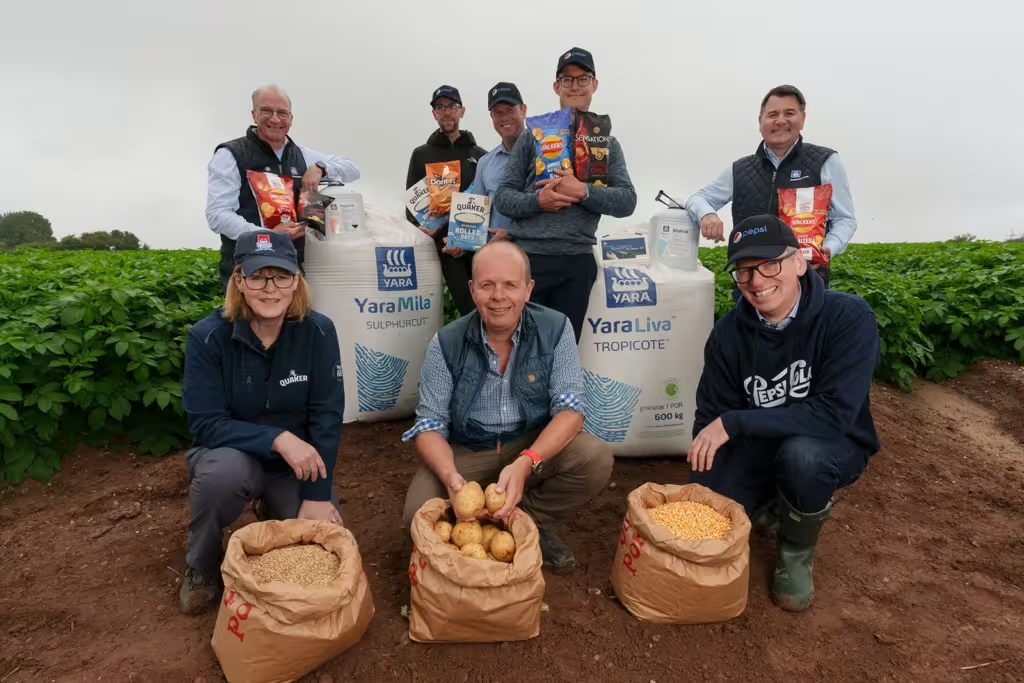
Acknowledgements
WBCSD developed this case study in collaboration with Anthesis.
About Anthesis
With world-class expertise in science-based advisory, market-leading digital solutions, the development of high-quality carbon removal projects and purpose consulting, strategy, and communications, Anthesis is uniquely positioned to manage risk and find value for our clients on their transformation journeys. Anthesis supports over 4,000 clients, across all industry sectors, including multinationals such as Reckitt, Cisco. Tesco, Nestlé, and Target. The company brings together 1,400 experts guiding clients in 80 countries around the world. For more information, visit www.anthesisgroup.com.
About Yara
Yara’s mission is to responsibly feed the world and protect the planet. We pursue a strategy of sustainable value growth through reducing emissions from crop nutrition production and developing low-emission energy solutions. Yara’s ambition is focused on growing a nature-positive food future that creates value for our customers, shareholders and society at large and delivers a more sustainable food value chain. To drive the green shift in fertilizer production, shipping, and other energy intensive industries, Yara will produce ammonia with significantly lower emissions. We provide digital tools for precision farming and work closely with partners at all levels of the food value chain to share knowledge and promote more efficient and sustainable solutions. Founded in 1905 to solve the emerging famine in Europe, Yara has established a unique position as the industry’s only global crop nutrition company. With 18,000 employees and operations in more than 60 countries, sustainability is an integral part of our business model. For more information, visit www.yara.com
About PepsiCo
PepsiCo products are enjoyed by consumers more than one billion times a day in more than 200 countries and territories around the world. PepsiCo generated more than $91 billion in net revenue in 2023, driven by a complementary beverage and convenient foods portfolio that includes Lay’s, Doritos, Cheetos, Gatorade, Pepsi-Cola, Mountain Dew, Quaker, and SodaStream. PepsiCo’s product portfolio includes a wide range of enjoyable foods and beverages, including many iconic brands that generate more than $1 billion each in estimated annual retail sales. Guiding PepsiCo is our vision to Be the Global Leader in Beverages and Convenient Foods by Winning with pep+ (PepsiCo Positive). pep+ is our strategic end-to-end transformation that puts sustainability and human capital at the center of how we will create value and growth by operating within planetary boundaries and inspiring positive change for planet and people. For more information, visit www.pepsico.com
Outline
Related
Content

A framework for carbon emissions management along the building and construction value chain
17 December, 2019
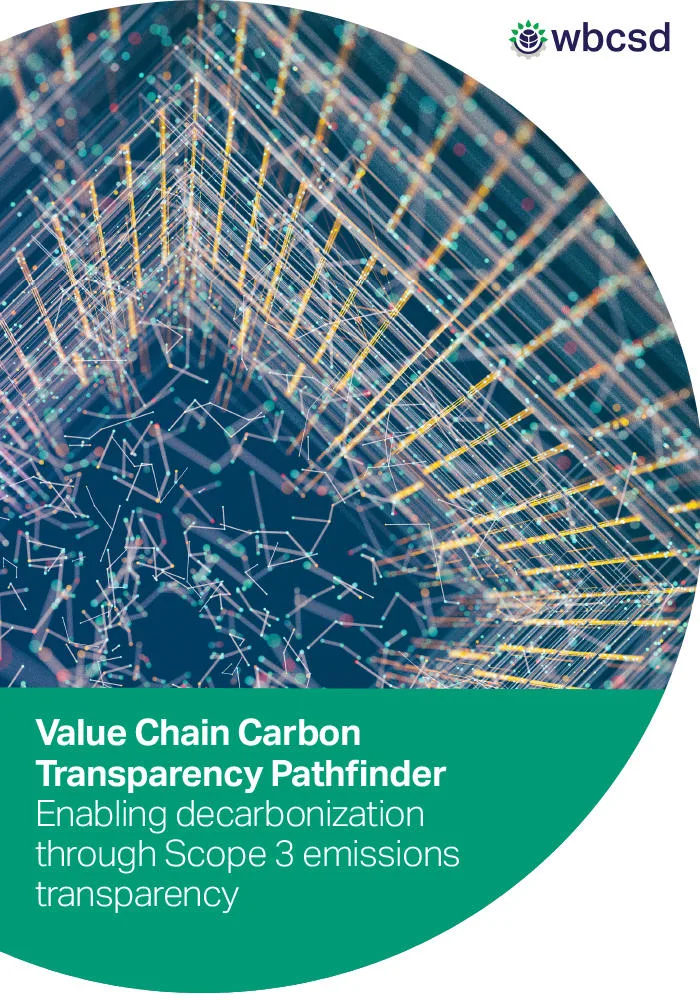
Value Chain Carbon Transparency Pathfinder
4 March, 2021

The Value Chain Carbon Transparency Pathfinder: Accelerating decarbonization by increasing Scope 3 emissions transparency across value chains
4 March, 2021
